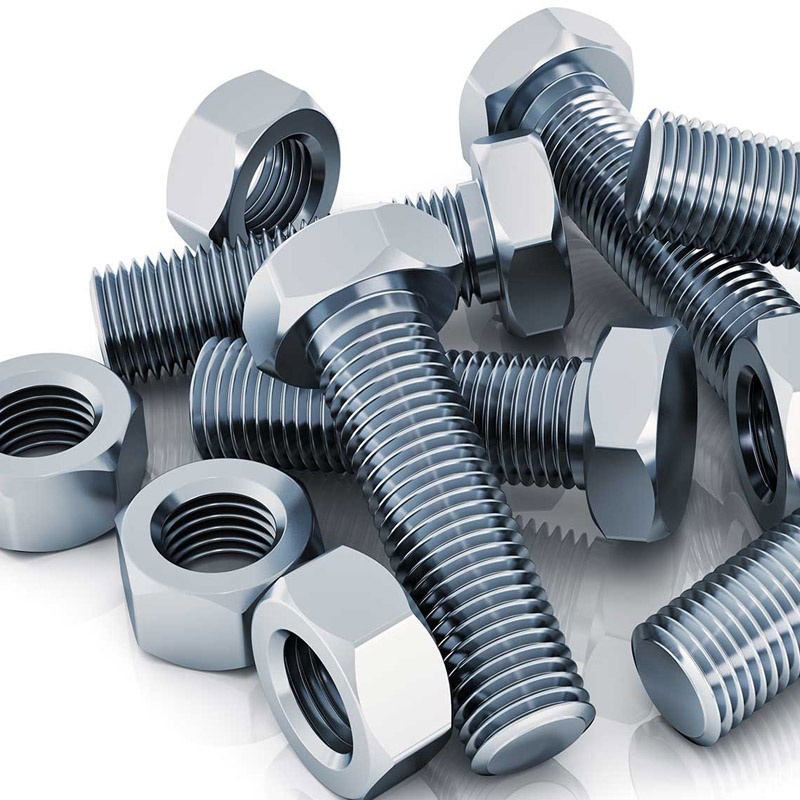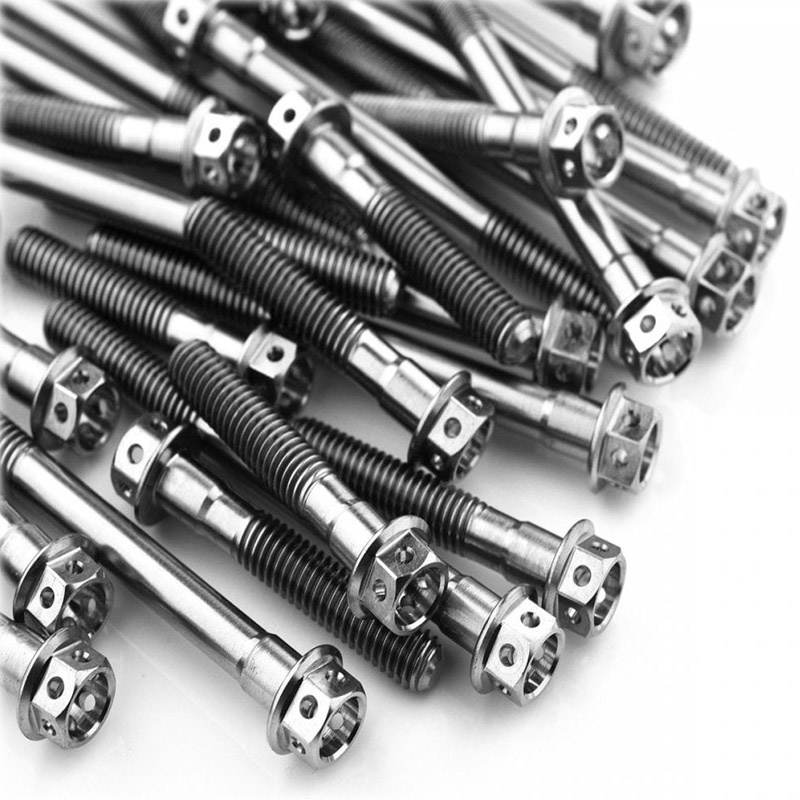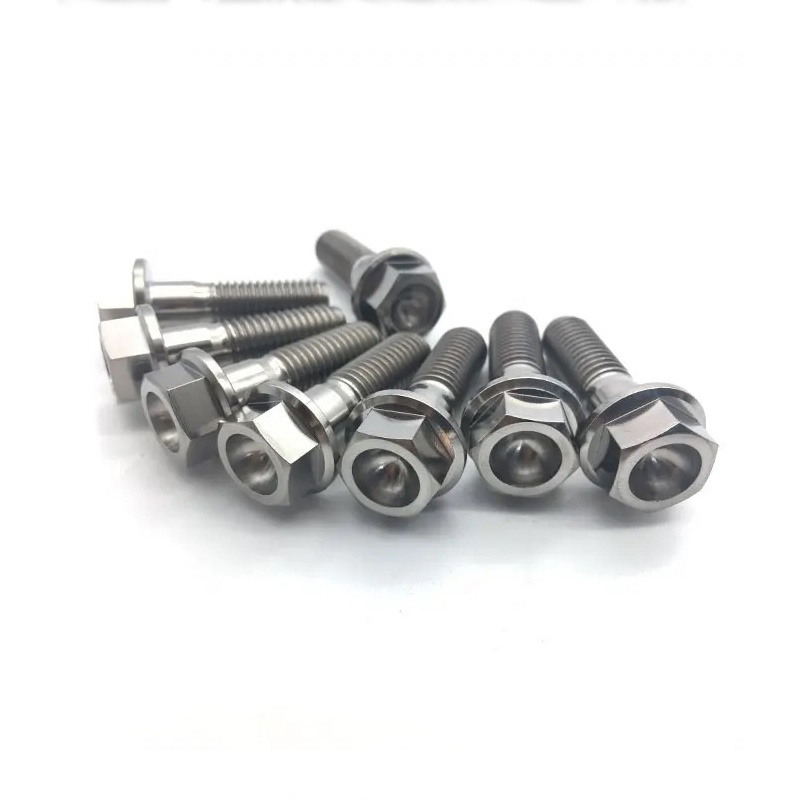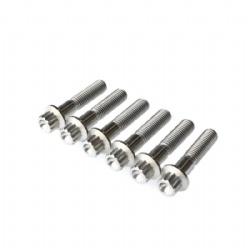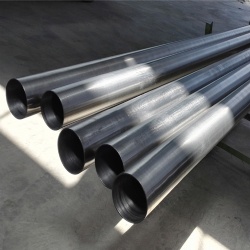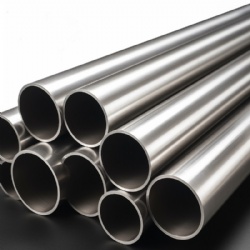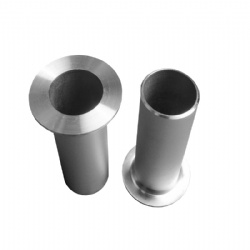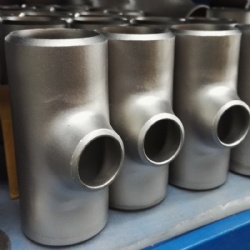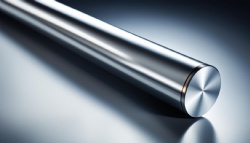Products >> Titanium >>
titanium bolts and nuts
- Product No.:202392515558
- Material Grade:Titanium commercially pure or titanium alloy
High-Quality Titanium Bolts and Nuts for Sale
If you're looking for premium bolts and nuts for your next DIY or industrial project, look no further than our high-quality titanium fasteners. Our titanium bolts and nuts are designed to offer exceptional durability, corrosion resistance, and optimal performance for a wide range of applications. Whether you're in need of fasteners for automotive, aerospace, or structural projects, our titanium bolts and nuts are the perfect fit for all your needs.

Key Takeaways:
- Titanium fasteners offer exceptional durability, corrosion resistance, and optimal performance.
- They are perfect for a wide range of applications, from DIY to industrial projects.
- Our high-quality titanium bolts and nuts ensure superior reliability and outstanding performance.
- Using the right titanium fasteners can help ensure durability and reliability for your projects.
- Investing in top-grade titanium bolts and nuts is a wise choice for anyone seeking reliable fasteners.
Benefits of Using Titanium Bolts and Nuts
When it comes to fasteners, titanium bolts and nuts are an excellent choice for a wide range of applications. One of the main benefits of using titanium bolts and nuts is their exceptional strength-to-weight ratio. In fact, titanium bolts are 40% lighter than their steel counterparts, making them an ideal choice for applications where weight is a critical factor.
Another key benefit of using titanium bolts and nuts is their high resistance to corrosion. Unlike steel, titanium resists rusting, which makes it an ideal choice for applications exposed to harsh environments. Additionally, titanium bolts and nuts can withstand extreme temperatures, making them suitable for applications such as aerospace, marine, and automotive industries.
With their high strength, durability, and resistance to corrosion, it's no surprise that titanium bolts and nuts are becoming increasingly popular. Not only do they offer better performance compared to traditional fasteners, but they also have a longer lifespan, which means less maintenance and replacement costs in the long run.
"Titanium bolts and nuts are a better choice compared to traditional fasteners due to their high corrosion resistance, strength-to-weight ratio, and ability to withstand extreme temperatures."
Find Where to Buy Titanium Bolts and Nuts
If you are looking for high-quality titanium bolts and nuts, you're in the right place. We understand that finding reliable sources can be a challenging task, especially when you're looking for specific requirements. That is why we have compiled a list of reputable suppliers and online stores that offer a wide range of options across geographies.
If you're in the USA, you can find titanium bolts and nuts at Titanium Technologies, Fastenal, and Titanium Joe. These suppliers offer a variety of titanium fasteners, including bolts, nuts, washers, and screws, to meet your specific needs.
Users in the UK can find top-grade titanium bolts and nuts at Titanium Fabrication Corporation, Tifoo, and Racebolt UK. These online stores offer fast shipping, excellent customer service, and competitive pricing.
If you are in Australia, you can find high-quality titanium bolts and nuts at T.I. Dynamics, Titanium Innovations, and Titanium Rapid. These local suppliers offer a wide range of products and services, including custom designs, coatings, and finishes.
Whether you're in the military, aerospace, or automotive industry, these suppliers and online stores provide the best quality and service for all your titanium needs. With their vast inventory of products and expertise in manufacturing and distribution, you can trust and rely on them for your every need.
Exploring the Cost of Titanium Bolts and Nuts
When it comes to investing in high-quality titanium bolts and nuts, cost is undoubtedly an important consideration. So, what factors influence the price of these products?
The grade of titanium: titanium comes in several different grades, each with varying levels of strength, durability, and resistance to corrosion. Naturally, higher grade titanium fasteners will be more expensive than lower grade ones due to their superior quality.
Quantity purchased: as with many products, buying in larger quantities can lead to a lower overall price per unit. So, if you need a large number of titanium bolts and nuts, it may be worth buying in bulk to save money in the long run.
Specific requirements: certain applications may require specific types of titanium bolts and nuts, which can affect the cost. For instance, if you need bolts that are particularly resistant to high temperatures, they may require extra processing and testing, which can increase the cost.
Titanium Bolts and Nuts Cost Comparison (per unit)
|
Supplier |
Grade |
Price ($) |
|
Titanium Industries |
Grade 5 |
15.99 |
|
Midwest Fasteners |
Grade 2 |
8.75 |
|
TMS Titanium |
Grade 7 |
21.50 |
It is important to note that the prices listed in the table are only for reference and may vary depending on several factors. It is always advisable to check with the supplier for an accurate quote before making any purchases.
By understanding the cost considerations of titanium bolts and nuts, users can make an informed decision that balances quality and budget. Using the right supplier and appropriate grade of titanium can lead to significant savings in the long term.
Understanding Titanium Bolts and Nuts Manufacturing Process
As a titanium nuts and bolts manufacturer, we pride ourselves on our mastery of the complex production process involved. The manufacturing process of titanium bolts and nuts begins with the extraction of titanium from its ores through chemical and physical methods.
Once the titanium has been obtained, it undergoes a series of processing steps before the final product is created. Our highly skilled engineers use state-of-the-art technology to shape and finish these products to meet the exact specifications required by clients.
Shaping and Finishing
The shaping of titanium is a critical process that requires precision and expertise. We use specialized machines to mold the titanium into the desired shape. The shaping marks the initial step to creating a high-quality titanium bolt or nut.
The finished product goes through rigorous testing and inspection to ensure that it meets industry standards for strength, durability, and reliability. Every bolt or nut must pass stringent quality control procedures before leaving our manufacturing facility.
Advantages of the Manufacturing Process
The expertise of our team and the use of state-of-the-art machinery offer several advantages for our clients. A careful manufacturing process means that our titanium bolts and nuts are of the highest quality.
This process guarantees that our products are reliable, durable, and long-lasting. The process of shaping and finishing titanium ensures that every bolt or nut meets our client's unique specifications.
|
The Advantages of Our Manufacturing Process |
|
Highly skilled engineers create customized high-quality products |
|
State-of-the-art technology ensures precision and consistency in the manufacturing process |
|
Strict quality control procedures guarantee the reliability and durability of our bolts and nuts |
|
Customization enables our clients to get exactly what they need for their projects |

Understanding the manufacturing process of titanium bolts and nuts is essential for appreciating the expertise and craftsmanship that goes into creating these products. By Using a product that will meet their individual needs.
Wide Options of Titanium Bolts and Nuts in the UK
When it comes to sourcing high-quality titanium nuts and bolts in the UK, customers have plenty of options to buy from. At Hengze industry, we offer a wide option of titanium bolts and nuts that are designed to meet the highest standards of durability and performance.
Our products cater to a diverse range of applications, from automotive and aerospace to industrial and marine projects. Customers can buy from various sizes, shapes, and specifications to find the perfect fit for their specific requirements.
One of the major advantages of using titanium bolts and nuts is their superior strength-to-weight ratio, making them ideal for applications where weight reduction is essential without compromising on performance. Additionally, titanium fasteners offer excellent corrosion resistance, making them a reliable choice for use in harsh environments.
To ensure the highest quality standards, all our titanium bolts and nuts are manufactured using premium-grade titanium and advanced manufacturing processes. Our expert team performs rigorous quality checks to ensure each product meets our customers' expectations.
If you are looking for reliable and long-lasting titanium nuts and bolts in the UK, look no further than [Brand Name]. Browse our range today and experience outstanding performance in your next project.
Top-Grade Titanium Bolts and Nuts in Australia
Australian enthusiasts and professionals alike now have access to a wide range of high-quality titanium nuts and bolts Australia for their projects. These top-grade fasteners are designed to offer exceptional strength, durability, and corrosion resistance, making them ideal for use in structural projects, automotive, aerospace, marine, and other applications.
When it comes to finding the right type of titanium bolts and nuts, customers in Australia have access to a broad range of options from many reputable local suppliers. These products come in various sizes, grades, and finishes, making it easy for users to find the perfect titanium fasteners for their needs.
One of the advantages of using Australian-made titanium nuts and bolts is the quality assurance that comes with it. Several local manufacturers have a reputation for producing high-quality fasteners adhering to international standards

Local Suppliers for Titanium Nuts and Bolts in Australia
|
Supplier |
Location |
Product Offerings |
Advantages |
|
Titanium Supplies Australia |
Brisbane, Queensland |
Titanium bolts, nuts, screws, washers, and rods |
High-quality products, Competitive pricing, Wide range of options |
|
Aircraft Materials Pty Ltd |
Moorabbin, Victoria |
Titanium nuts, bolts, and washers |
Quality products, ISO certification, Short lead times |
|
TIH Pty Ltd |
Bibra Lake, Western Australia |
Titanium fasteners, bolts, nuts, screws, washers, and flanges |
High-performance metals, Precision engineering and fabrication, Competitive pricing |
These local suppliers offer a broad range of titanium fasteners, each with unique advantages. Contact the right supplier for your project can make a significant difference in terms of product quality and pricing. Australia has many reputable suppliers; you need to research and connect the supplier that best suits your needs.
In conclusion, titanium nuts and bolts Australia offers high-quality, durable, and reliable fasteners for various applications, from automotive, aerospace, marine, structural, and other projects. With many reputable local suppliers and manufacturers, users can find a broad range of options to suit their needs and requirements.
Titanium Bolts and Nuts for Sale - Best Options
Looking for the best titanium bolts and nuts for your project? We've got you covered. Our high-quality titanium fasteners is designed to meet your specific needs and requirements. Whether you're working on an automotive project, aerospace application, or industrial machinery, we have the right product for you.
Our product range includes various grades of titanium bolts and nuts, all of which are known for their exceptional strength, durability, and corrosion resistance. From standard sizes to custom designs, we can supply you with the exact product you need.
We offer a wide range of options for purchasing titanium bolts and nuts, ensuring you can find the best fit for your project. Our products are available through online stores, local suppliers, and specific brands, allowing you to use the most convenient and reliable option.
Titanium Bolts and Nuts - Features and Specifications
Our titanium bolts and nuts come with various features and specifications that make them ideal for different applications. Some of the notable features include:
- High strength-to-weight ratio: Our titanium fasteners are known for their exceptional strength, making them suitable for demanding applications that require high-performance fasteners.
- Corrosion resistance: Titanium can resist corrosion even in harsh environments, ensuring long-lasting durability and reliability.
- Temperature tolerance: Our titanium bolts and nuts can withstand extreme temperatures without compromising their performance or structural integrity.
With these features, our titanium fasteners offer an excellent alternative to steel and other metals commonly used in fasteners.
Titanium Bolts and Nuts - Pricing
When it comes to pricing, several factors determine the cost of titanium bolts and nuts. These include the grade of titanium, quantity purchased, and specific requirements for the application. However, the cost is typically justified by the long-lasting durability and high-performance capabilities of these fasteners.
Where to Buy Titanium Bolts and Nuts
If you're looking for reliable sources to purchase titanium bolts and nuts, we've got you covered. We work with reputable suppliers and online stores that offer a wide range of options to suit different needs. Some of our top recommendations include:
|
Supplier |
Product Offerings |
Location |
|
Titanium Processing Center |
Custom bolts and nuts, standard sizes, different grades of titanium |
USA |
|
Fastener Factory |
Titanium bolts and nuts for various applications |
Australia |
|
Screw-Fix |
Titanium nuts and bolts for automotive and engineering applications |
UK |
By buying from a reliable supplier or online store, you can ensure that you get high-quality titanium bolts and nuts that meet your specifications.
Conclusion
We hope this article has been a helpful guide for anyone seeking reliable and high-quality titanium bolts and nuts. Investing in these exceptional fasteners offers numerous benefits, including durability, strength, and corrosion resistance. By understanding the available options, finding reputable suppliers, and learning about the manufacturing process, users can make an informed choice that best suits their specific needs.
Whether you are working on a DIY project, an automotive application, or an industrial project, titanium bolts and nuts are a reliable choice that can withstand extreme conditions and provide optimal performance. By connect the right suppliers and understanding the cost considerations, users can ensure that they are getting the best value for their investment.
Thank you for reading and we wish you all the best in your future projects!
FAQ
What are the benefits of using titanium bolts and nuts?
Titanium bolts and nuts offer exceptional strength-to-weight ratio, corrosion resistance, and the ability to withstand extreme temperatures. These qualities make them a reliable choice for a wide range of applications.
Where can I buy high-quality titanium bolts and nuts?
You can find a wide collection of high-quality titanium bolts and nuts from reputable suppliers and online stores. They offer various options to suit different requirements. Whether you are located in the UK, Australia, or any other location, you can find reliable sources for titanium nuts and bolts.
How much do titanium bolts and nuts cost?
The cost of titanium bolts and nuts depends on factors such as the grade of titanium, quantity purchased, and specific requirements. Understanding these factors can help you make informed decisions when investing in titanium fasteners.
How are titanium bolts and nuts made?
Titanium bolts and nuts are manufactured through a complex process. It involves extracting titanium, shaping it into the desired form, and applying finishing touches. This intricate manufacturing process ensures the production of high-quality titanium fasteners.
Are there wide options of titanium bolts and nuts available in the UK?
Yes, the UK offers a wide range of titanium bolts and nuts. There are numerous options and specifications to buy from, catering to various industries such as automotive, aerospace, and industrial applications.
What are the top-grade titanium bolts and nuts available in Australia?
Australia offers top-grade titanium bolts and nuts through local suppliers. These suppliers provide a range of product offerings suitable for marine applications, structural projects, and more. Contacting Australian-made titanium fasteners ensures quality and reliability.
Where can I find the best options for purchasing titanium bolts and nuts?
The best options for purchasing titanium bolts and nuts can be found through online stores, local suppliers, and specific brands. This comprehensive overview will highlight features, specifications, and pricing, allowing you to make a well-informed decision.
Contact Us

Name: Mr. Ren
Tel: +86-18292471213
E-mail: info(at)intemetal.com
Add: Middle Section Baotai Road, Weibin District, 721013, Baoji, Shaanxi Province, China




